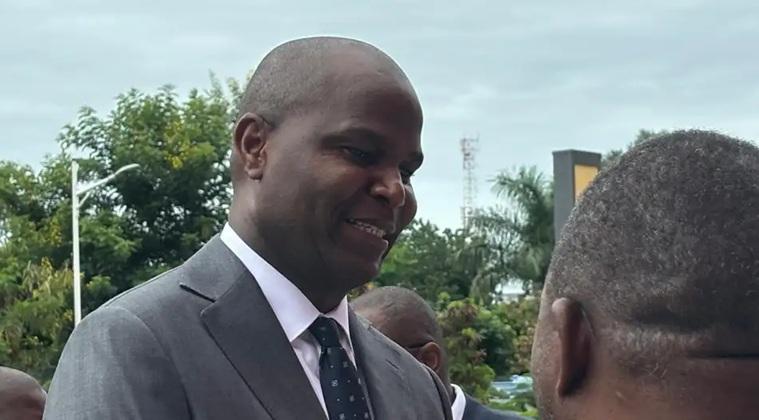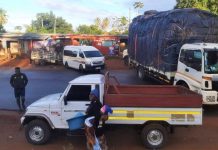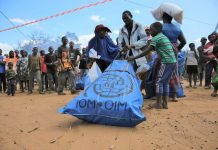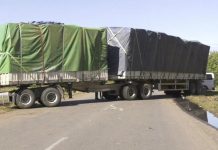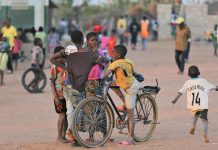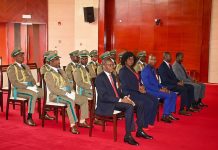Africa-Press – Mozambique. Daniel Chapo says the destruction in Zambézia during post-election protests was greater than that of the years of civil war, calling in Johannesburg on Sunday for unity against the far-right, which wants “puppet governments”.
“The damage is worse than that caused by the 16 Years’ War in these towns I’m referring to here in Zambézia province. And it’s only seen, said, no one believes,” said the President of Mozambique, Daniel Chapo, after his three-day visit to that central region of the country, which ended on Saturday.
“These are public and private assets, and the damage is enormous. These towns I’m talking about here – Morumbala, Mocubela, and the Macurra district – even during the 16 Years’ War, there wasn’t the level of destruction that occurred during the protests. During the 16 Years’ War, Renamo arrived in the town, invaded, but lived in these houses,” Chapo noted, acknowledging that these towns were “totally destroyed” during the protests, including hospitals and grocery stores, and calling for national reconciliation.
Zambézia authorities previously estimated they would need 1.5 billion meticais (€20 million) to rehabilitate the infrastructure destroyed in these post-election protests.
Civil war
The Mozambican civil war, also known as the ’16 Years’ War,’ pitted forces against the Mozambican government, the Mozambique Liberation Front (FRELIMO), and the Mozambican National Resistance (RENAMO) from 1977 to 1992, ending with the General Peace Agreement, after estimates of one million deaths and significant destruction.
In Zambézia, the head of state drew a parallel with the post-general election protests from October 9th until last March and their consequences in various areas of that province.
“[Renamo, during the war] lived in this administrator’s house, they lived in this secretariat, they lived in this school, they lived in this hospital, they even lived in this police station or police command. So the town was occupied, but they didn’t destroy it; they lived there. Therefore, when the General Peace Agreement was reached, some infrastructure in some main towns, like the ones I’m mentioning, was in good condition. But I’m talking about an entire town that disappeared,” he noted.
Post-election protests
Mozambique has experienced a climate of social unrest since the October 9, 2024, elections, with demonstrations and strikes called by Venâncio Mondlane, who rejects the election results that gave victory to Daniel Chapo, supported by the ruling FRELIMO party, as the fifth president.
According to non-governmental organizations, approximately 400 people died as a result of clashes with the police, in addition to the destruction of public and private property, looting, and violence. Conflicts that ceased after meetings between Mondlane and Chapo on March 23 and May 20, aimed at pacification, were held.
The Mozambican Public Prosecutor’s Office (MP) accused Mondlane of calling for a “revolution” during the post-election protests, provoking “panic” and “terror” among the population, holding him responsible for the deaths and for plunging the country into “chaos”.
In the indictment filed last week on Tuesday with the Attorney General’s Office (PGR) in Maputo against the former presidential candidate, the Public Prosecutor’s Office cites, as a large part of its evidence, calls for protests, strikes, work stoppages, and mobilization for protests made on Venâncio Mondlane’s live social media feeds throughout the various phases of the challenge to the 2024 electoral process in Mozambique.
“The acts committed by the defendant seriously jeopardized fundamental legal rights, such as the lives, physical and mental integrity of individuals, freedom of movement, public order, security, and tranquillity, as well as the normal functioning of public and private institutions,” it reads.
The Public Prosecutor’s Office accuses Venâncio Mondlane, who does not recognize the election results, of “material and moral authorship, in a real concurrence of infractions”, of the crimes of public condoning crime, incitement to collective disobedience, public instigation of a crime, instigation of terrorism, and incitement to terrorism.
After a visit to Zambézia that ended on Saturday, the FRELIMO leader and Mozambican head of state this Sunday (June 27) in Johannesburg called for the unity of the “liberation parties” of southern Africa against the far-right that seeks to bring “puppet governments” to power.
“Let us unite more as a single bloc to confront the threat looming over our liberation parties,” Chapo stated, speaking at the Liberation Movements Summit, hosted by the African National Congress (ANC) of South Africa.
“We are increasingly witnessing the intensification of support for chauvinistic far-right groups that use social media, Artificial Intelligence, and other platforms to spread disinformation through populist hate speech and the discrediting of the achievements of our governments and the conquests of our people,” Chapo warned at this meeting, which brought together leaders and cadres of the historic parties of southern Africa, including the People’s Movement for the Liberation of Angola (MPLA, in power since 1975).
For More News And Analysis About Mozambique Follow Africa-Press

